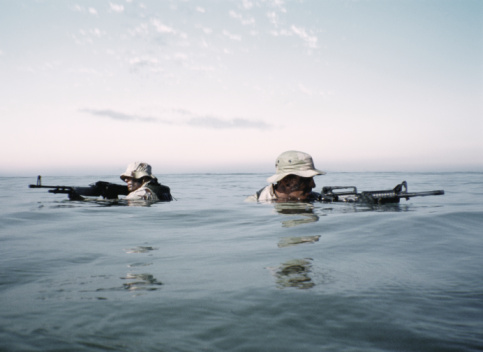We do not hear much about the Navy Seals, and with good reason. They are a secret set of special operatives. They are in the news now for their spectacular against-the-odds raid that killed Osama bin Laden. But they have been in the news before, and what they did then was also spectacular. In April of 2009, President Obama dispatched the Seals to rescue an American sea captain, Richard Phillips, being held hostage by Somali pirates, who demanded two million dollars for his release. The Seals were authorized to kill the pirates if that seemed necessary.
The Seals decided it was necessary when they saw the bound captain through a window of the pirates’ ship with an AK-47 aimed at him. It was nightfall, on a choppy sea. The Seal snipers on an American destroyer had to use night-vision scopes at a distance, but they killed (through the window) the man threatening Captain Phillips, and two other pirates who poked their heads out of a rear hatch. It was an almost superhuman bit of sharpshooting. If we had remembered this incident, we would not have been surprised at what the Seals did in their even greater and more dangerous descent on Osama’s compound in Pakistan.
But generally we did not remember how the pirates were taken out. It happened only two years ago, but the feat has been swamped by intervening events. The killing of the pirates stilled for a moment—a very brief moment—right-wing criticism that Barack Obama was flaccid or feckless on national defense and military action—the suggestion launched during the 2008 campaign with an ad saying he was not ready to take a 3 AM call about a national emergency. That claim had roared back, after the pirates were killed, and was still in force before the Pakistan raid. Now it is, once again, temporarily muted. In fact, some Americans are reacting, for the moment, like Mattie Ross: “No grit? I’ll say Barack Obama has true grit.” But we can expect the resumption of the old charges soon, just as after the shots that disposed of the pirates. We can also expect what happened after that earlier event. The pirates’ fellow Somalis vowed reprisals. Some in other nations feared that America had stirred up a hornet’s nest of piracy.
Things will be worse this time, since we are in the midst of contagious conspiratorialisms. Some right-wingers are already claiming that bin Laden was not killed (though al-Qaeda itself has now acknowledged his death). They are demanding his picture. Soon they may be asking to see bin Laden’s birth certificate. I don’t remember a demand to see the pictures of the dead pirates in 2009. But if that event had taken place in our current climate, I am sure we would have heard such a demand. We must brace ourselves for the craziness. Nonetheless, through it all, we should keep in mind what superb things can be done by our Navy Seals. And we should keep somewhere in the back of our minds a remembrance that the one ultimately pulling the trigger in both Seal actions was the President of the United States.



